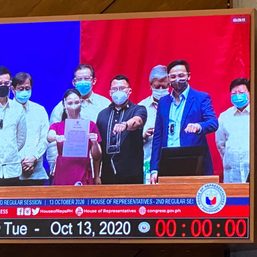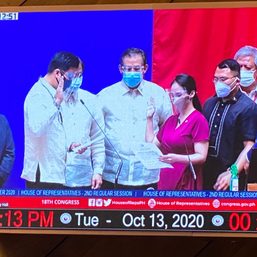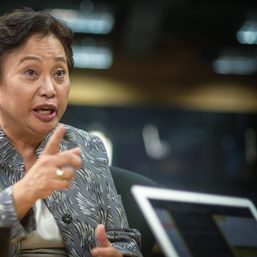SUMMARY
This is AI generated summarization, which may have errors. For context, always refer to the full article.

MANILA, Philippines – Saying it was never an “obscene” exhibition, the Office of the Ombudsman dismissed criminal complaints against the artist behind the controversial art exhibit “Kulo” and officials of the Cultural Center of the Philippines (CCP) who allowed the exhibit to run in August 2011.
In a joint resolution and decision dated February 28, Ombudsman Conchita Carpio-Morales dismissed the separate criminal complaints filed by Manuel Dayrit and Eusebio Dulatas Jr. against artist Mideo Cruz and CCP Board of Trustees Emily Abrera, Raul Sunico, Florangel Rosario-Braid, Jaime Laya, Isabel Caro Wilson, Zenaida Tantoco, Maria Cristina Turalba, Antonio Yap, Carolyn Espiritu and CCP Visual Arts and Museum Division Head Karen Ocampo Flores.
Dayrit and Dulatas said Cruz and the above CCP officials violated paragraph 2(b), Article 201 of the Revised Penal Code which covered the prohibitions against “Immoral doctrines, obscene publications and exhibitions, and indecent shows” in holding the “Kulo” exhibit, which featured Poleteismo, or Cruz’s much-talked about exhibit showing images of Jesus Christ and Mama Mary alongside condoms and phalluses, among others.
Carpio-Morales stressed that the above provision only applies to “live shows or moving images” because it used the phrase “whether live or in film.”
The Ombudsman clarified that Cruz’s exhibit could fall under paragraph (3) of Article 201 which covered “films, prints, engravings, sculpture or literature” but added that for it to be considered a violation, it must be offensive to morals and not only to religion.
Carpio-Morales said the exhibit could not be considered “obscene” because it did not depict “in a patently offensive way, sexual conduct nor appeals to the prurient interest.”
“Nor was it found to be lacking in serious literary, artistic, political or scientific value as to remove it from the ambit of constitutionally protected expression,” the Ombudmsman said.
The Ombudsman also invoked the ruling People v. Go Pin, where the Supreme Court said that for an art exhibit to be violative of the prohibition against obsencity, it must be conducted for commercial purposes.
The Ombudsman noted that “Kulo” was a free exhibit, not intended for commercial or profit gain.
The decision also noted the following:
a. Context – Poleteismo is a “showcase of the artists’ contribution to the discourse in art and social reality in line with Jose Rizal’s 150th birth anniversary”
b. Audience – the exhibit was for people interested in art; it was placed at the far end of the gallery and carried the warning that it may not be fit for minors
The Office of the Ombudsman also dismissed the administrative complaint filed against Abrera and other officials by Dayrit. Dayrit said Abrera and the other CCP officials violated Republic Act 6713 or the Code of Conduct and Ethical Standards of Public Officials.
The Ombudsman said they could not be held liable for allowing the “Kulo” exhibit because it’s not obscene in the first place. – Rappler.com
Add a comment
How does this make you feel?




![[PODCAST] Beyond the Stories: Ang milyon-milyong kontrata ng F2 Logistics mula sa Comelec](https://www.rappler.com/tachyon/2021/11/newsbreak-beyond-the-stories-square-with-topic-comelec.jpg?resize=257%2C257&crop_strategy=attention)





![[EDITORIAL] Ang low-intensity warfare ni Marcos kung saan attack dog na ang First Lady](https://www.rappler.com/tachyon/2024/04/animated-liza-marcos-sara-duterte-feud-carousel.jpg?resize=257%2C257&crop=294px%2C0px%2C720px%2C720px)
![[Free to disagree] How to be a cult leader or a demagogue president](https://www.rappler.com/tachyon/2024/04/TL-free-to-disagree.jpg?resize=257%2C257&crop_strategy=attention)
![[OPINION] Can Marcos survive a voters’ revolt in 2025?](https://www.rappler.com/tachyon/2024/04/tl-voters-revolt-04042024.jpg?resize=257%2C257&crop=251px%2C0px%2C720px%2C720px)
![[Edgewise] Quo vadis, Quiboloy?](https://www.rappler.com/tachyon/2024/03/quo-vadis-quiboloy-march-21-2024.jpg?resize=257%2C257&crop_strategy=attention)
There are no comments yet. Add your comment to start the conversation.